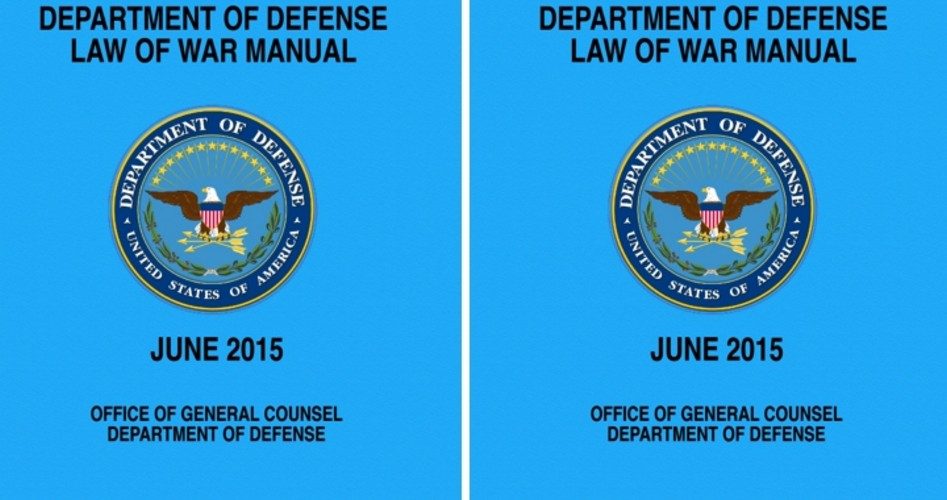
The most recent Department of Defense Law of War Manual, released on June 15, has come under fire from journalists for its guidelines that allow military commanders to treat journalists covering military operations as “unprivileged belligerents.” Members of the press and experts in military law say that this vague wording could be interpreted to expel members of the press from military bases — or even worse — detain journalists.
The editorial board of the New York Times published an editorial on August 10 (“The Pentagon’s Dangerous Views on the Wartime Press”) that called for the immediate repeal of the new guidelines for the treatment of journalists covering armed conflicts. The Times editorial asserted that the guidelines would make journalists’ “work more dangerous, cumbersome and subject to censorship.”
Among the language in the manual that the editorial board objects to is its description of the status of journalists, who, though generally regarded as civilians, may in some instances be classified as “unprivileged belligerents.” The editorial notes that this is a legal term that the DoD applies to fighters who are afforded fewer protections than the declared combatants in a war. The Times quoted from the document’s language noting that, in some instances, “the relaying of information (such as providing information of immediate use in combat operations) could constitute taking a direct part in hostilities.”
Furthermore, quotes the Times from the manual: “Reporting on military operations can be very similar to collecting intelligence or even spying.” The manual calls on journalists to “act openly and with the permission of relevant authorities” and notes that government authorities “may need to censor journalists’ work or take other security measures so that journalists do not reveal sensitive information to the enemy.”
While some of these DoD rules may seem like sensible precautions necessary to safeguard military intelligence during combat situations, and military censors have historically prevented details of military operations from being made public, the Times writers questioned the explanation provided by an unnamed senior Pentagon official, who — when asked to explain when a journalist might be deemed an “unprivileged belligerent” — gave as an example the assassination of the Afghan military commander Ahmad Shah Massoud in September 2001. The editorial noted:
That example is preposterous because Mr. Massoud was killed by assassins who posed as television journalists and hid explosives in a camera. They were not, in fact, journalists.
On August 11, Christophe Deloire, a French journalist and secretary-general of Reporters Without Borders, a Paris-based NGO, that concerns itself with journalist freedom and publishes an annual Press Freedom Index, wrote to Secretary of Defense Ashton Carter to share his organization’s concerns regarding certain provisions of the DoD’s Law of War Manual. Deloire specifically mentioned the manual’s use of the term “unprivileged belligerents” to potentially include journalists. Deloire wrote:
The term appears to be a synonym for the more commonly used “unlawful combatants” to designate a category of persons that do not benefit from the protections accorded to lawful combatants — members of armed forces that correctly apply the rules of law — and civilians.
Journalists typically benefit from the same protections as civilians under the Geneva Conventions, their Additional Protocols, as well as Customary International Law. This principle has also appeared in previous United States war manuals and handbooks.
Deloire referenced a phrase from the manual that the Times editorial also quoted, equating journalism with spying: “reporting on military operations can be very similar to collecting intelligence or even spying.”
He continued:
Likening journalistic activity to spying is just the kind of ammunition certain repressive countries like Iran, Syria, and China would seek out to support their practices of censorship and criminalization of journalists.
Reporters Without Borders ranked the United States 49th out of 180 nations on its 2015 World Press Freedom Index. Iran ranked 173rd, China ranked 176th, and Syria ranked 177th. Most of the nations in the top 10 were in Scandinavia, but Canada ranked number eight.
An August 10 AFP report quoted a statement from Lieutenant Colonel Joe Sowers, identified as a Pentagon spokesman, who said — in an apparent attempt to mollify the many concerns expressed by journalists — the manual is “not an authorization for any person to take any particular action related to journalists or anyone else.”
“It is not policy and the manual is not directive in nature.”
Sowers also addressed the Times editorial’s criticism of the DoD’s statement in the manual that the military “may need to censor journalists’ work”: “This unqualified statement seems to contravene American constitutional and case law, and offers other countries that routinely censor the press a handy reference point.”
To which Sowers responded:
We do not believe that the guidance in the manual will be used by authoritarian regimes in the way suggested in the editorial, and that was certainly not our intent.
The Department of Defense supports and respects the vital work that journalists perform. Their work in gathering and reporting news is essential to a free society and the rule of law.
Sowers added, however, that the Pentagon would take comments into account “as we review and seek to improve and clarify matters addressed in the manual.”
Responsible journalists have always understood that the success or failure of a military operation requires that strategic, sensitive, and secret information be kept under wraps. The true journalistic professional also respects embargos imposed by both military and non-military sources. Those who violate such trusts will soon wear out their welcome and will not be privy to important news releases.
The best balance between safeguarding military secrets and fostering freedom of the press comes from mutual respect and trust. When the government starts regarding professional journalists as “unprivileged belligerents,” however, that trust will start to unravel.



